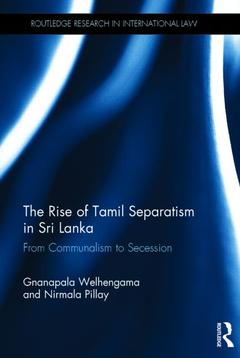The Rise of Tamil Separatism in Sri Lanka From Communalism to Secession Routledge Research in International Law Series
Auteurs : Welhengama Gnanapala, Pillay Nirmala

Among the examples of civil wars, armed secessionist movements and minority uprisings in the world today, many involve conflict between a minority group?s aim for political self-determination, and the nation state?s resistance to any diminution of sovereignty. With the expansion of the international regime of human rights, minority groups have reconceptualised their struggle with the understanding that a minority which is linguistically, religiously or ethnically distinctive is entitled to self-determination if their aspirations cannot be met.
This book explores the relationship between minority rights, self-determination and secession within international law, by contextualising these issues in a detailed case study of the rise of Tamil separatism in Sri Lanka. Welhengama and Pillay show how Tamil communalism hardened into secession and assess whether the Sri Lankan government has met its obligations with respect to the right to self-determination short of secession. Focusing on the legal and human rights arguments for secession by the Tamil community of the North and East of Sri Lanka, the book demonstrates how the language of international law and international human rights played a major role in the development of the arguments for secession. Through a close examination of the case of the Tamil?s secessionist movement the book presents valuable insights into why modern nation states find themselves threatened by separatist claims and bids for independence based on ethnicity.
1. Introduction 2. The Island and its People 3. The gift of Empire 4. The Dawn of Communalism 5. The role of Tamil Politicians of the time: The Ponnambalm Brothers 6. Winter of Discontent: Tamil Communalism 7. Politicians who championed communalism: G.G. Ponnambalm 8. The Emergence of Federalism 9. Edging Towards Secession. 10. Tamil separatism. Was it due to Sinhala Communalism? 11. Tamil Eelam by Virtue of Self-Determination 12. Devolution of Power as a Solution to the Ethnic Conflict of Sri Lanka 13. Conclusion
G. Welhengama is now retired but was previously principle of the Liverpool Community College. He was a lawyer and judge in Sri Lanka and also stood as an MP for the Rajapaksha party in Sri Lanka, before teaching at Liverpool John Moores University in the Faculty of Law.
Nirmala Pillay is senior lecturer in law at Liverpool John Moores University, UK.
Date de parution : 02-2014
15.6x23.4 cm
Date de parution : 03-2016
15.6x23.4 cm
Thèmes de The Rise of Tamil Separatism in Sri Lanka :
Mots-clés :
jaffna; peninsula; elite; ceylon; national; congress; politician; donoughmore; constitution; commission; Tamil Nadu; Ceylon Tamils; Young Man; Jaffna Tamil; Colonial Administration; Jaffna Peninsula; Sinhalese Buddhists; Low Country Sinhalese; Ceylon Reform League; Tamil Elite; Sinhalese Elite; Sinhala Buddhist; Constitutionalist Reformists; Tamil Politicians; Low Caste Tamils; Indo-Sri Lanka Accord; Donoughmore Commission; Tamil Eelam; Tamil Political Parties; Indian Tamils; Kandyan Sinhalese; Sinhalese Nationalism; Tamil Federal Party; Colombo Tamils; Youth Congress



